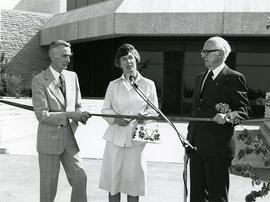Diefenbaker Canada Centre - Official Opening
- A-6648
- Pièce
- June 1980
Fait partie de University of Saskatchewan Photograph Collection
Carolyn Weir, daughter of Olive Palmer Diefenbaker and stepdaughter of John G. Diefenbaker, cuts ribbon and declares building open, assisted by R.W. Begg (left), University President, and Emmett M. Hall, University Chancellor.
Bio/Historical Note: Olive Evangeline Freeman was born 14 April 1902 in Roland, Manitoba. Due to her Baptist minister father’s occupation, she grew up moving around the Canadian Prairies. Olive first met her second husband John Diefenbaker in Saskatoon at a church where her father was working. Olive was enrolled as a student at the University of Saskatchewan in the mid-1910s. In May 1916, during World War I, John was commissioned a lieutenant into the 196th (Western Universities) Battalion, Canadian Expeditionary Force and the following September, he was part of a contingent of 300 junior officers sent to England for pre-deployment training. He left the military in 1917 and returned to Saskatchewan where he returned to earn a law degree in 1919.. Olive later earned a BA at McMaster University in Hamilton and the Ontario College of Education. In 1933 she started her career as a high school teacher and taught French at the Guelph Collegiate Vocational Institute in Ontario. In 1933 Olive met her first husband, Harry Palmer, a lawyer practicing in Toronto. He died in 1936 after only three years of marriage and one child, Carolyn Jane. During the marriage she stepped away from her profession but after Palmer’s untimely death she started a new career as the director of child guidance and counselling for the Ontario Department of Education. Olive reunited with John Diefenbaker in 1951 and they married in 1953 in Toronto. Diefenbaker's first wife, Edna Brower, died in 1951. Olive was a known supporter of the suffrage movement. During 1964 she spoke to a group of 600 people belonging to the Progressive Conservative Women's Association about the power of the unification of women in politics. After decades in the political spotlight with her husband, who was serving his 26th year as Member of Parliament for Prince Albert, Olive died in Ottawa at age 74. Olive Diefenbaker Drive in Prince Albert, Saskatchewan, is named in her honour. The Olive Diefenbaker Award of Merit is given to individuals who have made a contribution to the counselling and guidance profession in Ontario. Olive’s remains, buried in 1976 in Ottawa, were reburied in Saskatoon in 1979.
Bio/Historical Note: Carolyn Palmer married Donald Weir (b. 1930 – d. bef 2010) and settled in rural Ontario. She published the book The Right Honourable John George Diefenbaker: A Pictorial Tribute, in 1979. Carolyn died 31 July 2010, and is survived by five children: John, Michael, Vicky, Sarah and Sandy.



